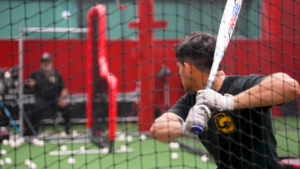Baseball players need to learn and develop specific skills and traits to succeed on the field. One crucial trait they need to possess, regardless of the position they play, is fast reaction time. This is why baseball mindset training is just as necessary for players as training their physique.
Reaction time in baseball

Reaction time gets thrown a lot in discussions about many different sports, especially baseball. Scientifically, it refers to the average time an organism takes to react to a particular stimulus. In baseball, it’s generally understood as how long a player takes to react to their opponent’s play. The better a player’s reaction time, the faster they can understand a play and make decisions toward their team’s success.
Although reaction time matters to baseball players regardless of the position they play, it’s often discussed in conjunction with hitters. To elaborate, consider that MLB pitchers usually throw at speeds exceeding 90 miles per hour (mph). After the pitcher throws the ball, the hitter must do several things.
First, they have to identify the kind of pitch. Is it a fastball or a breaking ball? They have to gauge how fast the ball is traveling and where it’s going. Is it an inside pitch, going down the middle, or out? Then, they have to finish their stride and hit the ball with their bat. Given the distance between the home plate and the pitching mound, professional hitters usually have around a third of a second to react and make the necessary decisions. Imagine that — a third of a second!
But it’s not just about hitting. An outfielder must quickly react and make a play on a fly ball. A third baseman should be able to read the ball off the bat and get into position to stop it from going down the foul line. The catcher needs to be ready to throw out a base runner stealing second. All of these scenarios require excellent reaction time.
Improving reaction time

For Vaughn Sports Academy (VSA) Coach Mike Easler, baseball is as much a mental game as it is a physical one. To develop your reaction time, you have to develop your eyes, body, mind, and baseball IQ. Don’t guess; instead, anticipate: he says he learned this throughout his career as an MLB player and hitting coach. Anticipating by observing the play and what the other players on the field do is vital to reacting quickly and correctly.
Consider hitting techniques in baseball, for instance. As a hitter, you need to observe how the pitcher throws the ball and read its movement as it flies toward you. But how do you do this in the split second between the pitch and hitting the ball? Do you undergo special baseball training for timing? Coach Mike says this is where consistency comes in. Consistently observe what other players do, how they play, and how the ball moves. Learn strategy. Doing these builds your baseball IQ and helps you understand what to do when the situation demands it.
At the same time, work on your form and perfect your technique. Practice repeatedly until everything becomes second nature. With how fast-paced baseball games are, you won’t have a lot of time to stop and think about your next move on the field. Repetition helps ensure you react perfectly and instinctively every time. One of Coach Mike’s favorite baseball coaching tips sums it up nicely: “Perfect practice makes perfect.”
Baseball is an intense sport, and building the proper mindset is just as important as performing baseball drills for youth players. To train the speed, quality, and accuracy of your reactions, you need to maximize your understanding of the game and practice repeatedly until you can move perfectly on pure instinct. That’s quite a tall order, especially for someone not yet on the level of pros, but having the guidance of mentors like Coach Mike Easler can definitely help. Unlock your potential to succeed on the field by training with VSA today.



